Israel–Russia relations
Israel–Russia relations refers to the bilateral foreign relations between the two countries, Israel and Russia. Russia has an embassy in Tel Aviv and a consulate in Haifa. Israel has an embassy in Moscow and a consulate-general (to open) in Yekaterinburg.
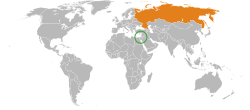 | |
Israel |
Russia |
|---|---|
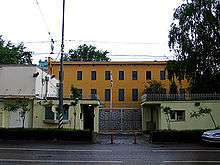
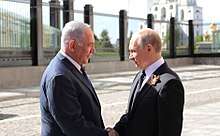
Russia is a member of the Quartet on the Middle East. For many years, Israel was a sanctuary for many Russian Jews. This was especially the case during the aliyah in the 1970s and 1990s. Israel and Russia were on opposing sides during the Cold War. However, the relationship between Israel and Russia began to improve significantly from the early 2000s onwards, with the election of the more pro-Israel, Russian leader Vladimir Putin, and in 2001 with election of the more pro-Russian, Israeli leader Ariel Sharon.[1]
Israel is part Russophone and considered to be the world's only part Russophone country outside the former Soviet Union. Russian is the third most widely spoken first language in Israel, after Hebrew and Arabic, and has the third largest number of Russian speakers outside former Soviet countries, and the highest as a proportion of the total population.[2]
Over 100,000 Israeli citizens live in Russia,[3] with 80,000 Israelis living in Moscow,[4] while hundreds of thousands of Russian citizens reside in Israel, from around 1.5 million native Russian-speaking Israelis.[5]
History
The Soviet period
With the German invasion of Russia in 1941, Joseph Stalin reversed his long-standing opposition to Zionism, and tried to mobilize worldwide Jewish support for the Soviet war effort. The Jewish Anti-Fascist Committee was set up in Moscow. Many thousands of Jewish refugees fled the Nazis and entered the Soviet Union during the war, where they reinvigorated Jewish religious activities and opened new synagogues.[6] From late 1944, Stalin adopted an openly pro-Zionist foreign policy, apparently believing that the new country would be socialist and would speed the decline of British influence in the Middle East.[7]
In May 1947 Soviet Deputy Foreign Minister Andrei Gromyko told the United Nations that the USSR supported the partition of Palestine into a Jewish and an Arab state.[8] The USSR and its satellites voted in November 1947 for the United Nations Partition Plan for Palestine.[9] It paved the way for the creation of the State of Israel. On 17 May 1948, three days after Israel declared its independence, the Soviet Union officially recognized Israel.[10]
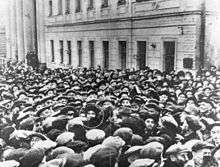
Golda Meir was appointed Israel's minister to the Soviet Union, with her term beginning on 2 September 1948 and ending in March 1949. She attended Rosh Hashanah and Yom Kippur services at the Moscow Choral Synagogue.[11] However once Israel was established, Stalin reversed positions, favoured the Arabs, arrested the leaders of the Jewish Anti-Fascist Committee, and launched attacks on Jews in the USSR.[12]
These relations were severed by the Soviet government in June 1967, in protest of Israeli policy during the Six Day War and immediately after. The Soviet Union supported Israel's Arab enemies with arms and training, and Soviet forces were deployed to Egypt during the War of Attrition, where they repeatedly engaged Israeli forces.
After the Soviet Union cut off diplomatic relations with Israel due to the Six-Day War, the Dutch Embassy in Moscow established an Israel interests' section which represented Israel in the Soviet Union until diplomatic relations were reestablished in January 1991.[13]
After the fall of Communism
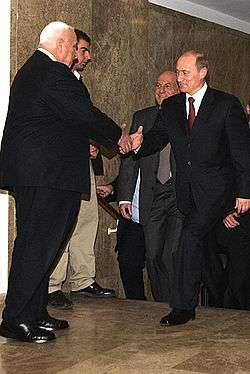
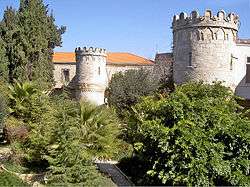
The Soviet Union resumed diplomatic relations with Israel on 18 October 1991.[14] The journalist Alexander Bovin became the first Soviet ambassador to Israel in 24 years. After the Soviet Union collapsed two months later, he continued to serve as Russia's ambassador to Israel.
The dissolution of the Soviet Union caused a very large immigration wave of Jews from Soviet states. Due to demand from the new immigrants, many Russian language newspapers appeared, and with the development of the multichannel television in Israel during the 1990s, many Russian channels started being rebroadcast in Israel. In November 2002, a new Israeli-Russian channel, Israel Plus, emerged.
On 19 October 1999, Defence Minister of China, General Chi Haotian, after meeting with Syrian Defense Minister Mustafa Tlass in Damascus, Syria, to discuss expanding military ties between Syria and China, flew to Israel and met with Ehud Barak, the then Prime Minister and Defence Minister of Israel, where they discussed military relations. Among the military arrangements was a $1 billion Israeli-Russian sale of military aircraft to China, which were to be jointly produced by Russia and Israel.[15]
In 1999, as Foreign Minister, Ariel Sharon began to court more friendly relations with Russia as a result of the large-scale immigration of Russian-speakers to Israel, saying "The Russian vote will decide the outcome of the [Israeli] election".[16]
Relations between Israel and Russia were improved by Israeli opposition to the 1999 NATO bombing of Yugoslavia,[17] as well as Israeli support for IMF loans to Russia.[18] Russian Prime Minister Yevgeny Primakov subsequently said that if he was an Israeli, he would vote for incumbent Prime Minister Benjamin Netanyahu in the 1999 Israeli general election.[18]
2000s
The relationship between Israel and Russia only substantially began to improve in 2000, with the election of the more pro-Israel Vladimir Putin, and in 2001 with election of the more pro-Russian Ariel Sharon, who described Putin as "a true friend of Israel".[1]
In 2006, Israeli troops found evidence of Russian made Kornet-E and Metis-M anti-tank systems in Hezbollah's possession in southern Lebanon. In 2007, in response to accusations that it was supplying terrorist groups with weapons, Russia said it was conducting inspections of Syrian weapons storage facilities to prevent the weapons from reaching unintended customers. This strained the already-deteriorating relations between Russia and Israel.[19]
In 2006, Vladimir Zhirinovsky visiting as part of a government delegation said that he was concerned particularly about the economic situation for the more than one million Russians living in Israel, and that "Russia will never allow any kind of violence against Israel".[20][21]
Russia planned to sell advanced surface-to-air missiles to neighboring countries,[22] and condemned Israel's actions in the Gaza War.[23][24] Russia also sent 60 tons of tent, medicines, food and other humanitarian aid to the Palestinians.[25][26]
2010s
In 2011, Putin said: "Israel is, in fact, a special state to us. It is practically a Russian-speaking country. Israel is one of the few foreign countries that can be called Russian-speaking. It's apparent that more than half of the population speaks Russian".[27] Putin additionally claimed that Israel could be considered part of the Russian cultural world, and contended that "songs which are considered to be national Israeli songs in Israel are in fact Russian national songs". He further stated that he regarded Russian-speaking Israeli citizens as his compatriots and part of the 'Russian world'.[28]
In April 2014, Israel took a neutral stance on the Russian annexation of Crimea at the United Nations, angering U.S. State Department and White House officials.[29]
During Operation Protective Edge in 2014, Putin stated that "I support Israel's battle that is intended to keep its citizens protected".[30]
In August 2014, Russia began increasing fruit imports from Israel, after banning food imports from the EU, Norway, United States, Canada and Australia.[31]
In October 2014, India and Israel started to export meat to Russia.[32]
Relations between Israel and Russia further improved after the Russian military intervention in Syria in September 2015. From then until July 2018, Israeli Prime Minister Benjamin Netanyahu and Putin met a total of 9 times.[33]
In October 2015, Israel and Russia held meetings to coordinate over Syria, and avoid accidentally clashing or scrambling each other's communications while operating over the country.[34][35]
In March 2016, Putin said the relations with Israel were special and based "on friendship, mutual understanding and the long common history". Putin stated: "Russia and Israel have developed a special relationship. 1.5 million Israeli citizens come from the former Soviet Union, they speak the Russian language, are the bearers of Russian culture, Russian mentality. They maintain relations with their relatives and friends in Russia, and this make the interstate relations very special".[36]
In a meeting with Netanyahu in June 2016, Putin described Israel and Russia as "unconditional allies" in "efforts to counter international terrorism".[37]
Prior to and immediately after the 2016 United States presidential election, Israel began lobbying the United States to strike a deal with Russia over restricting the Iranian military presence in Syria in exchange for removing sanctions over Russian military action in Ukraine.[38] Donald Trump was reportedly a favorite candidate for both Russia and Israel, as Trump is widely seen, by both, as a strong supporter for Israel yet friendly to Russia.[39] Both Israel and Russia are still being accused for meddling in 2016 U.S. Election on helping Trump to power, with Vladimir Putin is found to have exclusive influence on Benjamin Netanyahu and Donald Trump's political decisions in Israel and the United States.[40]
In December 2016, Netanyahu instructed Israel's UN delegation to skip a General Assembly vote on war crimes committed in Syria, under diplomatic pressure from Russia.[41] The following day, Russian UN Ambassador Vitaly Churkin proposed postponing a vote on Security Council Resolution 2334 to condemn Israeli settlement-building in the West Bank until after the inauguration of U.S. President Donald Trump, in order to allow the new U.S. administration a say on the resolution, but this was rejected by other Security Council members.[42]
In January 2017, Russian Foreign Minister Sergey Lavrov stated that Israel and Russia were "working closely" together in an attempt to stop the extradition of dual Russian-Israeli citizen Alexander Lapshin from Belarus to Azerbaijan.[43]
In March 2018, Israel declined to attribute the poisoning of Sergei and Yulia Skripal to Russia in its statement on the matter and refused to expel any Russian diplomats, drawing criticism from the United Kingdom.[44]
In May 2018, Defence Minister Avigdor Lieberman stated the Israeli government had opposed sanctions on Russia despite foreign pressure to support them.[45]
At the 2018 Russia–United States summit in July 2018, U.S. President Donald Trump and Putin agreed to cooperate in Syria to ensure Israel's security.[46] U.S. National Security Advisor John R. Bolton later claimed that both Israel and Russia sought the withdrawal of Iranian forces from Syria.[47] Russia later offered to create a 100 kilometre buffer zone on the Syrian side of the Israel-Syria border which Iranian troops would be barred from, though this offer was rejected by Israel.[48]
.jpg)
In September 2018, relations somewhat deteriorated after the Russian Defense Ministry blamed the Israeli military for the downing of a Russian plane after putting it in the path of Syrian air defence systems during an Israeli strike on Hezbollah targets in Syria.[49] Although Putin initially absolved Israel,[50] Russia subsequently upgraded Syrian air defences to the S-300 missile system over Israeli objections,[51] refused Israeli offers to send a delegation to Moscow to resolve the dispute,[52] and ignored attempts by the Israeli Prime Minister's Office to set up a meeting with Putin.[53]
In December 2018, Russia backed Israel's security concerns over Hezbollah tunnels dug under the Israel-Lebanon border, urging Lebanon to resolve the issue.[54]
On 25 December 2018, Russia condemned an Israeli airstrike on a Syrian arms depot, claiming that the "provocative actions of the Israeli air force... directly threatened two airliners."[55]
On 7 February 2019, the Russian Deputy Foreign Minister urged Israel to cease its airstrikes in Syria.[56]
Relations were repaired after a meeting between Putin and Netanyahu in Moscow on 29 February 2019, after which Netanyahu announced Russian support for removing Iranian fighters from Syria, and that Putin had accepted his offer to visit Jerusalem.[57]
On 3 March 2019, Netanyahu announced the establishment of a joint Israeli-Russian team to pursue the withdrawal of all foreign troops deployed in Syria.[58]
On 18 March 2019, Putin suggested inviting Netanyahu to Crimea for the opening of a new synagogue there.[59]
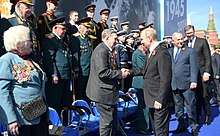
During the period preceding the April 2019 Israeli legislative election, Shin Bet chief Nadav Argaman warned that an unnamed foreign country was planning to interfere in the election, with media speculation focusing on Russia. Russia denied the reports, with Putin's press secretary, Dmitry Peskov stating that it was "out of the question" and suggesting "to not read the Israeli media".[60] Benny Gantz and Tamar Zandberg, the leaders of the opposition parties Blue and White and Meretz respectively, subsequently accused Russia of favouring Netanyahu.[61][62]
Relations improved after 4 April 2019, when Netanyahu again travelled to Moscow to meet Putin. Putin returned the remains of IDF soldier Zechariah Baumel, which had been recovered by Russian troops in Syria. Netanyahu subsequently thanked Putin for their "personal friendship", while Putin expressed his appreciation for the Israeli policy of honouring Red Army soldiers who fought in World War II. Netanyahu also specifically praised the Russian defense ministry, despite its criticisms of Israel following the downing of a Russian plane the year prior, for its contribution to the retrieval of Baumel's remains, which Netanyahu said Israel would "never forget".[63]
On 25 June 2019, Israel convened its first trilateral summit between its national security adviser and his respective American and Russian counterparts, specifically focusing on the Iranian military presence in Syria.[64]
In October 2019, Russia arrested Israeli national, Naama Issachar for alleged drug smuggling.[65][66] Issachar's family and Israeli officials claimed that Russia had told them she could be released if Aleksei Burkov, a Russian national pending extradition from Israel to the United States, was released to Russia.[67] Netanyahu subsequently personally requested a pardon for Issachar from Putin,[68] which Putin said he would consider.[69] Israel's High Court ultimately rejected Burkov's appeal against his extradition, leading Russia to condemn the decision as "a breach ... of Israel's international obligations", claiming that the decision "does not contribute to the development of [Russian-Israeli] relations".[70] On 29 January 2020, President Putin signed her pardon.[65] Her attorney previously noted that no convicted foreigner was ever pardoned by a Russian President before.[71]
2020s
On 10 January 2020, Israel released two Syrian prisoners, including one convicted of espionage, as part of a "gesture of goodwill" in a deal brokered by Russia.[72]
On 15 January 2020, an Asia Times report cited an Israeli foreign ministry as stating that Russia expected Israeli diplomatic assistance in ending Western sanctions on the Syrian government in return for permitting the continuation of Israeli airstrikes in Syria.[73]
In August 2020, following the normalization of Israel–United Arab Emirates relations, Russia was one of the earliest nations to congratulate the efforts by Israel to normalize the relations.[74]
Expatriate communities
Russian language in Israel
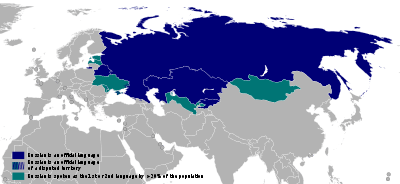
The native Russian-speaking population of Israel is the world's third-largest population of Russian native-speakers living outside the former Soviet Union territories, and the highest as a proportion of the population.[75][76] The number of native Russian-speaking Israelis numbers around 1.5 million citizens.[5]
Russian citizens living in Israel
Hundreds of thousands of Russian-Israeli citizens live in Israel. During Russian elections, the Russian government sets up polling stations across many Israeli cities as well as smaller towns, in order to enable the Russian citizens who are living in Israel to cast their vote. During the 2012 Russian Presidential elections, hundreds of thousands of Russian-Israelis could cast their vote in Israel.[77]
In the 2018 Russian Presidential Election, Vladimir Putin was the most popular candidate within Russian Israeli voters, winning 72.62% of the vote in Israel, with Ksenia Sobchak coming in second place with 13.42%.[78] However, despite Russia setting up 14 polling stations in Israel, voter turnout was particularly low, with less than 10% of eligible Russian Israeli dual citizens in Israel showing up to vote on the day.[79]
The political party United Russia has opened an overseas branch in Israel.[80] The Liberal Democratic Party of Russia also previously had an overseas branch in Israel.[81]
Victory Day in Israel
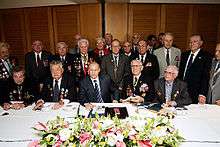
Israel hosts the most extensive Victory Day celebrations outside the former USSR.[82] Due to the large number of Red Army veterans who retired to Israel from former Soviet countries, the Russian government and military regularly send delegations to meet with the Red Army veterans associations in Israel, as well as to take part in the annual Victory Day events.[83]
Israeli community of Moscow
Moscow has the largest Israeli expatriate community in the world, with 80,000 Israeli citizens living in the city as of 2014, almost all of them native Russian-speakers.[84][85] Many Israeli cultural events are hosted for the community, and many live part of the year in Israel. To cater to the Israeli community, Israeli cultural centres are located in Moscow, Saint Petersburg, Novosibirsk and Yekaterinburg.[86] There are 60 flights a week between Tel Aviv and Moscow.[84]
Military collaboration
In 2004, a three-way deal was signed between Israel, Russia and India: Israel supplied the $1.1 billion EL/W-2090 radar to the Indian Air Force, with the radar fitted onto the Ilyushin Il-76 platform by Russia.[87]
On 6 September 2010, Russia and Israel signed a five-year military agreement.[88][89]
Drones
In April 2009, Russia purchased its first package of drones from Israel (the Bird Eye-400, eight I-View Mk150 and two Searcher Mk.2 UAVs). The deal was worth $53 million.[90]
In a second deal, at the end of 2009, Russia purchased an additional 36 drones from Israel, in a deal worth $100 million.[87]
In October 2010, in a third deal, Russia purchased an additional $400 million of drones from Israel Aerospace Industries. The Israeli drones are to be assembled in Russia.[91] The production of the Russian-Israeli drones began in 2012, with delivery to the Russian military scheduled for 2014.[87]
In 2015, one of the drones was reportedly shot down by the Ukrainian military near the city of Donetsk, Ukraine. [92]
In September 2015, the Russian Army purchased another $300 million package of drones from Israel, its fourth purchase of Israeli drones.[93]
Russian tourism to Israel
Israel became in recent years a destination for Russian tourists. The city of Tel Aviv in particular is a popular destination in Russia due to its ease for Russian-speakers, hot weather, and beaches.[94] According to polls, Russian tourist satisfaction after visiting Israel was found to be significantly higher than the average, compared with lower satisfaction ratings from tourists from other countries visiting Israel.[94] Almost 500,000 Russian tourists visited Israel in 2014. However, in 2015, Russian tourist numbers to Israel fell dramatically due to the economic crisis in Russia and the fall in the value of the ruble.[95] The 2015 economic crisis in Russia precipitated a crisis in Israel's tourism industry, as many Russian tourists could no longer afford to visit Israel, leading to a fall in total tourism to Israel.[96] The level of tourism from Russia to Israel continued to fall significantly in 2015.[97] By 2018, after years of downturn, Russian tourist numbers to Israel had begun to slightly recover, with Russian tourists once again the second largest body of foreign tourists in Israel, and being particularly important for the resort town of Eilat.[98]
.jpg)
Over 400,000 pilgrims from Russia visited Israel in 2015-2016, said Patriarch Kirill of Moscow. Patriarch Kirill said that the fact that "people in Israel speak Russian creates a special atmosphere for our pilgrims, and they often feel at home in Israel". Speaking about the life of the Jewish community in Russia, he cited the chief rabbi of Russia: "He has told me many times that he does not know any other such place than Russia, where Christians and Jews have such good relations".[99]
Russian oil supplies to Israel
As of 2014, Russia is Israel's largest supplier of crude oil (alongside Kazakhstan and Azerbaijan).[100] As of 2016, Russia was Israel's main supplier of oil.[101]
Israel–Russia visa-free agreement
In 2008, Israel and Russia signed the visa-free agreement, allowing mutual visa-free travel between the two countries. Immigrants from Russia and other former Soviet republics account for a significant proportion of Israel's citizens, meaning that visits to friends and relatives in Russia are likely to be facilitated.[102]
Customs union talks
Israel plans to enter a free-trade agreement with Russia. The Customs Union, bringing together Belarus, Kazakhstan and Russia, and Israel have launched an exploratory committee to study the prospects for the creation of a free trade zone, the Eurasian Economic Commission (EEC - a single permanent regulatory body of the Customs Union) reported in March 2014.[103]
Encrypted communication line
Russia and Israel have agreed to install a direct encrypted communication network, to facilitate communications between the Russian President and Israeli Prime Minister. One analyst says: "Russia feels very close to the Israeli leadership... The Russians want to speak to Israel without anyone eavesdropping."[104]
Medical collaboration
Joint training
Israel and Russia partake in joint medical training of specialists. The Moscow Government has implemented a training program for metropolitan doctors and nurses to train in the leading Israeli hospitals: Hadassah, Ichilov Hospital, Sheba Medical Center, and Ramat Aviv Medical Center. Several hundred Russian medical specialists from Moscow hospitals are trained in Israel each year.[105]
Hadassah Medical Center
Beginning in 2018, Israel's Hadassah Medical Center, in agreement with the Mayor of Moscow, opened a branch in Skolkovo, becoming the first foreign hospital to open in Russia.[106][107] The Hadassah project in Russia was estimated at $40.2 million, of which about $26.4 million will go to equip the center with equipment. In addition, $3.2 million will be spent on educational activities. It is planned that 10% of the income generated by Israel's Hadassah medical center in Skolkovo will be directed to research activities in the field of oncology.[108]
Scientific collaboration agreements
Space
In 2011, Israel and Russia signed the Space Co-operation Agreement. The framework agreement is meant to develop joint research programs and other collaborations in areas like astrophysical and planetary research, space biology and medicine, navigational satellites and launching services and technology.[109]
Nuclear technology
In 2013, the Israeli and Russian government signed agreements to collaborate on nuclear imaging and the development of radioactive materials for dental treatments. Although the agreement is limited to medical treatments, it could form the basis for wider collaboration for ventures between the two countries in nuclear technology.[110]
Technology incubators
In the field of technology incubators, collaborative projects are being establish between the two states. Rusnano, the Russian government's vehicle for investments in nanotechnology, has established a branch in Israel, with the aim of setting up a fund for investment in Israeli nanotechnology ventures.[111] Similarly, Russia's Skolkovo innovation center has established a branch in Israel, the Israel-Skolkovo Gateway/Center (IsraelSK), which involves raising private capital and government grants leveraging for Israeli and Russian start-up companies.[112]
In 2016, Igor Drozdev, chairman of the board of the Skolkovo Foundation, signed a cooperation agreement with the Mayor of Yokneam, with the aim of collaboration in the development of technology between the two countries.[113][114]
In 2018, Yandex opened a computer science school in Israel for local students, in collaboration with Tel Aviv University's department of Computer Science. The school subsidized by Yandex, which will teach 50 Israeli students a year, will focus primarily in "machine learning". Joseph Klafter, president of Tel Aviv University, said: "The new joint educational program will help develop the IT sphere and national economies of both Russia and Israel."[115]
Plekhanov Russian University of Economics hold a joint course in blockchain development with the Israeli School of IT and Israel's HackerU.[116]
See also
- International recognition of Israel
- History of the Jews in Russia
- Jewish Autonomous Oblast
- Russia and the Arab–Israeli conflict
- Antisemitism in Russia
- Antisemitism in the Soviet Union
- Antisemitism in the Russian Empire
- Russian people in Israel
- Russian Jews in Israel
- Russian language in Israel
- Church of Mary Magdalene
- Russian Compound
References
- The Maturing of Israeli-Russian Relations Anna Borshchevskaya, inFocus Quarterly, Spring 2016
- Putin Pledges To Protect All Ethnic Russians Anywhere, So, Where Are They? By Robert Coalson for Radio Free Europe/Radio Liberty, 10 April 2014
- [100,000 Former Soviet Jews In Israel Return To Russia, By Michael Mainville, The Toronto Star]
- Russian-born Israelis Chase Capitalist Dreams to Moscow Ofer Matan 21 February 2014, Haaretz
- К визиту Нетаньяху: что Россия может получить от экономики Израиля Алексей Голубович, Forbes Russia, 9 March 2017
- Hiroaki Kuromiya (2013). Stalin. Routledge. p. 193.
- Paul Johnson, A History of the Jews (1987) p.527
- P. Mendes (2014). Jews and the Left: The Rise and Fall of a Political Alliance. Springer. p. 107.
- See UN General Assembly Resolution 181 Israel Ministry of Foreign Affairs
- Philip Marshall Brown, "The Recognition of Israel," The American Journal of International Law 42#3 (1948) pp. 620-627 online
- Yossi Goldstein, "Doomed to Fail: Golda Meir's Mission to Moscow (Part 1)", The Israel Journal of Foreign Affairs Vol. 5 No. 3 (September 2011), pg. 131
- Gabriel Gorodetsky, "The Soviet Union's role in the creation of the state of Israel." Journal of Israeli History 22.1 (2003): 4-20.
- "They did not dwell alone. The emigration from the Soviet Union. 1967 - 1990. During the representation of Israeli Interests by the Netherlands Embassy in Moscow." Summary of dissertation at the Rijksuniversiteit Groningen by Petrus Buwalda. Groningen, 1996.
- Haberman, Clyde (19 October 1991). "Israel and Soviets Restore Full Relations". The New York Times.
- "China defense minister visits Israel". Archived 30 May 2012 at the Wayback Machine World Tribune. Thursday, 21 October 1999
- Little Russia Monday 3 May 1999, The Guardian
- "CRISIS IN THE BALKANS: THE ISRAELIS; Netanyahu's Absence of Outrage Over Atrocities Ignites a Debate". The New York Times. 31 March 1999.
- Elazar, Daniel (2001). Israel at the Polls, 1999. Psychology Press. p. 218.
- Ariel Cohen (20 March 2007). "Russia's New Middle Eastern Policy: Back to Bismarck?". Jcpa.org. Retrieved 22 October 2016.
- Владимир Жириновский: я – не "сын юриста". Рассказ об отце время публикации: 25 июня 2006 г, Newsru.co.il
- Жириновский в Израиле говорил об антисемитизме на Украине 25 февраля 2014 г., 21:14, NewsRU.co.il
- Hassonyesterday, Nir. "Netanyahu aide likely to pay price for 'secret' Russia trip - Haaretz - Israel News". Haaretz.com. Retrieved 22 October 2016.
- Israel Kills at least 225 and wounded 700 People in Gaza, 28 December 2008 Sunday 2:5 Archived 15 June 2011 at the Wayback Machine.Turkishweekly.net. Retrieved on 8 January 2009
- Reuters AlertNet - Russia asks Israel to end Gaza attacks, let in aid.Alertnet.org. Retrieved on 8 January 2009
- "Российская гуманитарная помощь доставлена в сектор Газа | РИА Новости". Rian.ru. Retrieved 22 October 2016.
- "Медведев поручил оказать дополнительную помощь Палестине". Vesti.ru. 17 October 2016. Retrieved 22 October 2016.
- "Russian Prime Minister Putin: Israel Is, in Fact, a Special State to Us". Eajc.org. 20 July 2011. Archived from the original on 22 October 2016. Retrieved 22 October 2016.
- DIASPORA & CITIZENSHIP, by Claire Sutherland, Elena Barabantseva, (Routledge 2013), page 88
- Ravid, Barak (13 April 2014). "U.S. Officials Angry: Israel Doesn't Back Stance on Russia" – via Haaretz.
- https://fjc.ru/president-putin-support-israel/
- Hassonyesterday, Nir (13 August 2014). "After shunning Europe, Russia turning to Israel for fruit imports". Haaretz.com. Retrieved 22 October 2016.
- "India and Israel to supply meat and dairy to Russia". Rt.com. 28 October 2014. Retrieved 22 October 2016.
- "Analysis: The message in the Netanyahu - Putin meeting - Israel News". www.jpost.com.
- Netanyahu says ties with Russia good, doesn't join criticism of Syria attacks i24 News, 4 October 2015
- Russia-Israel Military Coordination Talks to Open Tuesday Reuters, 6 October 2015
- Putin says he plans to meet Israeli prime minister soon 16 March, Tass
- "PUTIN TO NETANYAHU: ISRAEL, RUSSIA 'UNCONDITIONAL ALLIES' IN WAR AGAINST TERROR". Jerusalem Post. 7 June 2016.
- Entous, Adam (10 July 2018). "Israeli, Saudi, and Emirati Officials Privately Pushed for Trump to Strike a "Grand Bargain" with Putin" – via www.newyorker.com.
- Marwan Bishara. "Netanyahu, Trump and Putin: A love story". Al Jazeera. Retrieved 22 February 2020.
- "Putin is pulling for Netanyahu as he did for Trump – but this time in broad daylight". Haaretz.com. 3 April 2019.
- "Netanyahu orders Israeli mission to skip UN vote on Syrian war crimes". Ynetnews. 27 December 2018.
- "Britain Pulled the Strings and Netanyahu Warned New Zealand It Was Declaring War: New Details on Israel's Battle Against the UN Vote". Haaretz. 28 December 2016.
- https://www.haaretz.com/israel-news/russia-will-act-to-prevent-extradition-of-israeli-blogger-1.5486919
- Keinon, Herb (20 March 2018). "UK not pleased with Israeli response to poison attack on ex-Russian spy". Jpost.com.
- Gross, Judah Ari. "Liberman to Russian media: Israel 'did not join' Western action against Moscow". www.timesofisrael.com.
- "Trump, Putin Vow to Cooperate on Syria, Ensure Israel's Security". 16 July 2018 – via Haaretz.
- "Top Trump adviser: US, Israel, Russia all want Iran out of Syria". www.timesofisrael.com.
- "Russia Offers To Keep Pro-Iran Forces 100 Kilometers From Israeli Border". RadioFreeEurope/RadioLiberty.
- "Russia blames Israel after plane shot down". 18 September 2018 – via www.bbc.co.uk.
- Halbfinger, David M.; Higgins, Andrew (18 September 2018). "Putin Calls Downing of Russian Plane in Syria 'Tragic' and Absolves Israel" – via NYTimes.com.
- "Russia to upgrade Syrian air defences". 24 September 2018 – via www.bbc.co.uk.
- "Russia said to spurn Israeli bid to send top officials to discuss downed plane". www.timesofisrael.com.
- "Russia-Israel crisis deepens after latest IAF strike in Syria". Ynetnews. 11 January 2018.
- "Russia reportedly tells Lebanon to keep border with Israel quiet". 17 December 2018.
- "Russia condemns 'Israeli' air strikes on Syria". BBC. 26 December 2018.
- "Russia urges Israel to stop Syria air strikes". Arutz Sheva. 8 February 2019.
- "Russia Wants to Get Iran Out of Syria, Netanyahu Says After Putin Meet". Haaretz. 27 February 2019.
- "Putin, Netanyahu Agreed on Pullout of Foreign Troops From Syria". Bloomberg. 3 March 2019.
- "Putin suggests inviting Netanyahu to Crimea for synagogue unveiling". Times of Israel. 18 March 2019.
- "Russia denies it is planning to interfere in Israeli elections". Times of Israel. 9 January 2019.
- "Israel Believes Russia Will Intervene in Its Elections". Asharq Al-Awsat. 10 January 2019.
- "'If Netanyahu Had a Way to Get Me Hurt, Killed, He Would,' Gantz Says in Leaked Recording". Haaretz. 24 March 2019.
- "Putin, Netanyahu break ground on deeper Russia-Israel engagement". Al-Monitor. 4 April 2019.
- Ben Caspit (26 June 2019). "Israeli, Russian, US interests converge on Iran in Syria". Al-monitor.com.
- "Russian President Putin signed decree to pardon Naama Issachar". The Jerusalem Post. Retrieved 29 January 2020.
- Freking, Kevin (23 October 2019). "Russian media releases photo of jailed Israeli Naama Issachar". The Times of Israel.
- "Suspected hacker's extradition focuses attention on Israeli-American in Russian jail". Nbcnews.com. Retrieved 22 February 2020.
- Keinon, Herb (22 October 2019). "Netanyahu asks Putin personally for Naama Issachar pardon". Jpost.com.
- Jaffe, Alexandra (6 December 2019). "Netanyahu, Putin speak ahead of visit by Russian leader to Israel next month". The Times of Israel.
- "Russia condemns Israel's rejection of hacker's appeal against extradition". Jpost.com. 11 November 2019.
- Peoples, Steve (28 January 2020). "Moscow governor signs Naama Issachar's pardon, leaving only Putin". The Times of Israel.
- Peoples, Steve (10 January 2020). "Israel releases Syrian spy, Golan ambulance attacker, in goodwill gesture". The Times of Israel.
- Ben, Shaiel (15 January 2020). "Putin calls on Netanyahu amid struggle for Syria". Asia Times. Retrieved 22 February 2020.
- https://iz.ru/1048328/2020-08-14/v-mid-rossii-vydelili-kliuchevoi-element-soglasheniia-izrailia-i-oae
- Reeves, Philip (2 January 2013). "On Multiple Fronts, Russian Jews Reshape Israel". NPR. Retrieved 23 October 2013.
- Estrin, Daniel (2 January 2013). "Back from the USSR". Times of Israel. Retrieved 23 October 2013.
- Russian-Israelis vote for next Kremlin leader by Polina Perlman, Published: 03.04.12, ynetnews
- Counted: "Russian" Israel voted for Putin 19 March 2018, 9tv
- Лишь каждый десятый имеющий право голоса "русский израильтянин" пошел на выборы 19 March 2018, 9tv
- Russian PM Putin to Open Official Party Branch in Israel Lily Galili and Haaretz Correspondent 21 August 2008
- Freedman, Robert (2018). Contemporary Israel. Routledge. p. 113.
- Israel to host most extensive Victory Day celebrations outside of former USSR Archived 27 July 2014 at the Wayback Machine 7 May, Voice of Russia
- Жириновский в Израиле говорил об антисемитизме на Украине 25 февраля 2014 г., 21:14, NEWsru.co.il
- Israelis Find A Lively Jewish Niche in Moscow by Rena Greenberg - Moscow, Russia, 19 March 2014
- Russian-born Israelis chase capitalist dreams to Moscow By Ofer Matan, 21 February 2014, Haaretz
- "Новости израильских культурных центров | Израиль для вас". Il4u.org.il. Retrieved 22 October 2016.
- "Россия и Израиль: путь к военному сотрудничеству". Rusplt.ru. 20 May 2016. Retrieved 22 October 2016.
- "Russia and Israel sign military agreement — RT News". Rt.com. Retrieved 22 October 2016.
- "Russia boosts military cooperation with Israel". 6 September 2010. Archived from the original on 15 September 2010. Retrieved 22 February 2020.
- Sputnik (16 May 2012). "Russia 'May Buy' $50 Mln Worth of Israeli UAVs". En.ria.ru. Retrieved 22 October 2016.
- Hassonyesterday, Nir (14 October 2010). "Israel signs $400 million deal to sell spy drones to Russia - Haaretz - Israel News". Haaretz.com. Retrieved 22 October 2016.
- Bender, Dave (16 September 2014). "Israel Backs Off Ukraine Drone Deal, Fearing Russian Ire: Report (VIDEO) | Jewish & Israel News". Algemeiner.com. Retrieved 22 October 2016.
- Российская армия продолжит закупать беспилотники израильской разработки 3 September 2015, Ведомости, Алексей Никольский
- Russian tourists flock to Tel Aviv instead of vacationing in Europe By Lital Levin, 7 May 2010, Haaretz
- Israeli tourism industry praying for a Russian revival By Rina Rozenberg, 24 March 2015, Haaretz
- Russian tourists stop coming to Israel's southern resort By Rina Rozenberg, 18 February 2015, Haaretz
- SELECTED STATISTICAL INFORMATION, CALCULATED IN ACCORDANCE WITH THE OFFICIAL STATISTICAL METHODOLOGY FOR ESTIMATING THE NUMBER OF ENTRY AND EXIT TOURIST TRIPS ROSTURISM
- ЧИСЛО РОССИЙСКИХ ТУРИСТОВ В ИЗРАИЛЕ ВЫРОСЛО НА 6% В ЯНВАРЕ-АПРЕЛЕ - ДО 116,2 ТЫС. ЧЕЛОВЕК 04.06 08:12
- Russian pilgrims feel at home in Israel - Patriarch Kirill 18 March 2016, 10:00
- Israel and Kazakhstan: Assessing the state of bilateral relations Kevjn Lim, 6 May 2014, Open Briefing
- "К визиту Нетаньяху: что Россия может получить от экономики Израиля - Финансы и инвестиции". Forbes.ru. 9 March 2017.
- Russia, Israel sign visa-free agreement RIA Novosti, 20 March 2008
- Israel may create free trade zone - Customs Union Archived 14 June 2014 at the Wayback Machine 18 March 2014, Voice of Russia
- Netanyahu and Putin to get direct and secure hotline By Itamar Eichner, 06.01.14, ynetnews.com
- Пути расширения сотрудничества обсудили на форуме «Израиль-Россия» в Москве 29 сентября 2017, 09:46, mos.ru
- Israeli Hadassah Center to take part in the creation of a medical cluster in Skolkovo 14 September 2017, 18:28
- The medical cluster in Skolkovo will take the first patients in the summer 30 May, 9:41
- "Для оснащения медкластера "Сколково" привлекут 40 миллионов долларов". Телеканал 360°.
- Hassonyesterday, Nir (28 March 2011). "Israel, Russia sign space agency cooperation agreement - Haaretz - Israel News". Haaretz.com. Retrieved 22 October 2016.
- "Israel, Russia to collaborate on dental nuclear imaging". Globes English. Retrieved 22 October 2016.
- "Rusnano Israel to help Russias Rusnano cultivate Israeli nanotech developers | Central regions, Finance, business". Marchmontnews.com. Retrieved 22 October 2016.
- "Israel Skolkovo Gateway". Israelsk.com. Archived from the original on 30 September 2011. Retrieved 24 September 2011.
- Taisiya, Yarmak (11 November 2016). "The Skolkovo Foundation and Yoqneam Illit City signed cooperation agreement during the official visit of the Russian Prime Minister Dmitry Medvedev to Israel". sk.ru. Retrieved 17 November 2016.
- Anastasia (11 November 2016). "Moscow, Jerusalem to develop cooperation in construction and innovation". The Eurasian Press Agency. Retrieved 17 November 2016.
- Россияне научат израильтян: "Яндекс" открывает Школу анализа данных в Израиле 24 July 2018 21:58, 9tv.co.il
- "РЭУ им. Г.В. Плеханова и Израильская высшая школа IT и безопасности HackerU запустили курс по блокчейн-разработке". www.rea.ru.
External links
| Wikimedia Commons has media related to Relations of Israel and Russia. |

